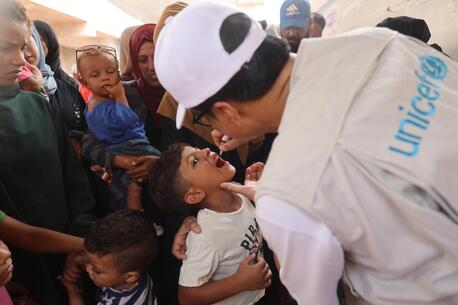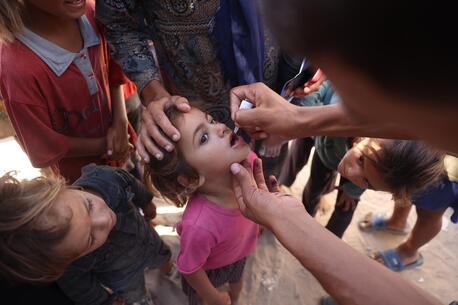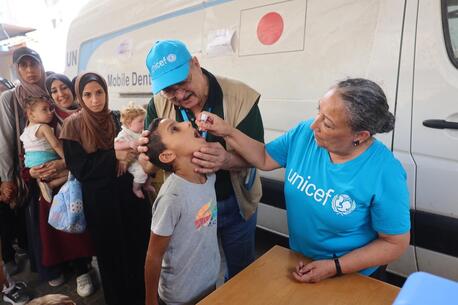
Polio Vaccinators Build Trust to Protect Children in Pakistan
Nearly one-third of Pakistan's children between the ages of 12 and 23 months miss out on basic vaccines they need to stay alive and healthy — some, because they live in hard-to-reach areas, and others, because their parents have misconceptions about the importance of immunization.
"To this day, many people in my community think that vaccines are a conspiracy to prevent them from having more children, or to harm them in some way," explains veteran vaccinator Farzana Shakeel, 42, who has been pelted with stones, shouted at and threatened during door-to-door polio vaccination campaigns in Karachi.
But health workers persevere, because they believe in the importance of their mission. "On some days we have less energy and courage to complete our work," says Shakeel's fellow vaccinator, Arshad Muhammad, 45. "But we remind ourselves of all the lives we are saving, and the energy comes back."

© UNICEF/UNI217679/Zaidi
Shakeel and Mohammed are two of the many vaccinators helping Pakistan's Expanded Program on Immunization (EPI) reach every child in the country. UNICEF and other partners support the Government of Pakistan's work to save children from vaccine-preventable diseases, especially in the most marginalized communities.
Above, UNICEF-supported health worker Nasreen Aslam gives the oral polio vaccine to 1-year-old Ahmad in Dara Chaudhry Kamran, Lahore Punjab Province, Pakistan in January 2019.

© UNICEF/UNI217686/Zaidi
Highly contagious, paralyzing and potentially fatal, polio can strike at any age but mainly affects children under age 5. The disease is incurable but easily preventable with multiple doses of a simple vaccine.
Above, 4-year-old Aneesa is vaccinated by polio worker Saima Shahid in the doorway of her home in the Bhatti Gate area of Lahore Punjab Province, Pakistan.

© UNICEF/UNI217683/Zaidi
To convince parents to immunize their children, vaccinators involve village elders, religious leaders and community influencers. "Parents become less aggressive once I have interacted with them for several months," says Shakeel, who has three children of her own. "But there are always new parents who are unwelcoming, reminding me of how I used to struggle when I first started."
Standing outside their home in Dara Chaudhry Kamran, Lahore, Punjab Province, Pakistan, Anessa (right) and Rashida are excited about staying healthy.

© UNICEF/UNI217684/Zaidi
In 1988, UNICEF, Rotary International and partners formed a global initiative dedicated to eradicating polio worldwide once and for all. Every year, hundreds of Rotary members work side-by-side with health workers to vaccinate children in polio-affected countries. Currently, there are just two countries that have yet to stop transmission of polio: Afghanistan and Pakistan. So far in 2019, 88 children have been disabled by the wild polio virus in the two countries. While this is higher than the 32 cases reported in 2018, it is a dramatic decrease from the 350,000 cases in 125 countries in 1988. Nigeria, the third polio-endemic country, has crossed three years without a case of wild polio and is on track with the African region to be certified wild polio virus free.
Above, 5-year-olds Abdullah (left) and Mariyam proudly show the ink marks that signify they've been vaccinated against polio in the Ponch House area of Lahore Punjab Province, Pakistan.

© UNICEF/UNI217677/Zaidi
In September, polio reemerged in the Philippines, prompting renewed calls for parents to vaccinate all children under the age of 5. The country was declared wild polio-free in 2000 but vaccine hesitancy has caused a steady decline in immunization coverage over the past few years.
To eliminate polio completely, every child in every household must be vaccinated. Ajwa, 4, shows the ink mark on her little finger confirming she has received the polio vaccine at Lahore railway station in Lahore Punjab Province, Pakistan in January 2019.
See how far vaccinators are willing to go to reach every child:
With reporting by UNICEF Communications Officer Aadarsh Laghari
Top photo, Aneesa, 5, shows the purple ink mark on her little finger that signifies she has received her polio vaccine from a UNICEF-supported vaccinator in the Bhatti Gate area of Lahore Punjab Province, Pakistan. © UNICEF/UNI217682/Zaidi
HOW TO HELP
There are many ways to make a difference
War, famine, poverty, natural disasters — threats to the world's children keep coming. But UNICEF won't stop working to keep children healthy and safe.
UNICEF works in over 190 countries and territories — more places than any other children's organization. UNICEF has the world's largest humanitarian warehouse and, when disaster strikes, can get supplies almost anywhere within 72 hours. Constantly innovating, always advocating for a better world for children, UNICEF works to ensure that every child can grow up healthy, educated, protected and respected.
Would you like to help give all children the opportunity to reach their full potential? There are many ways to get involved.





